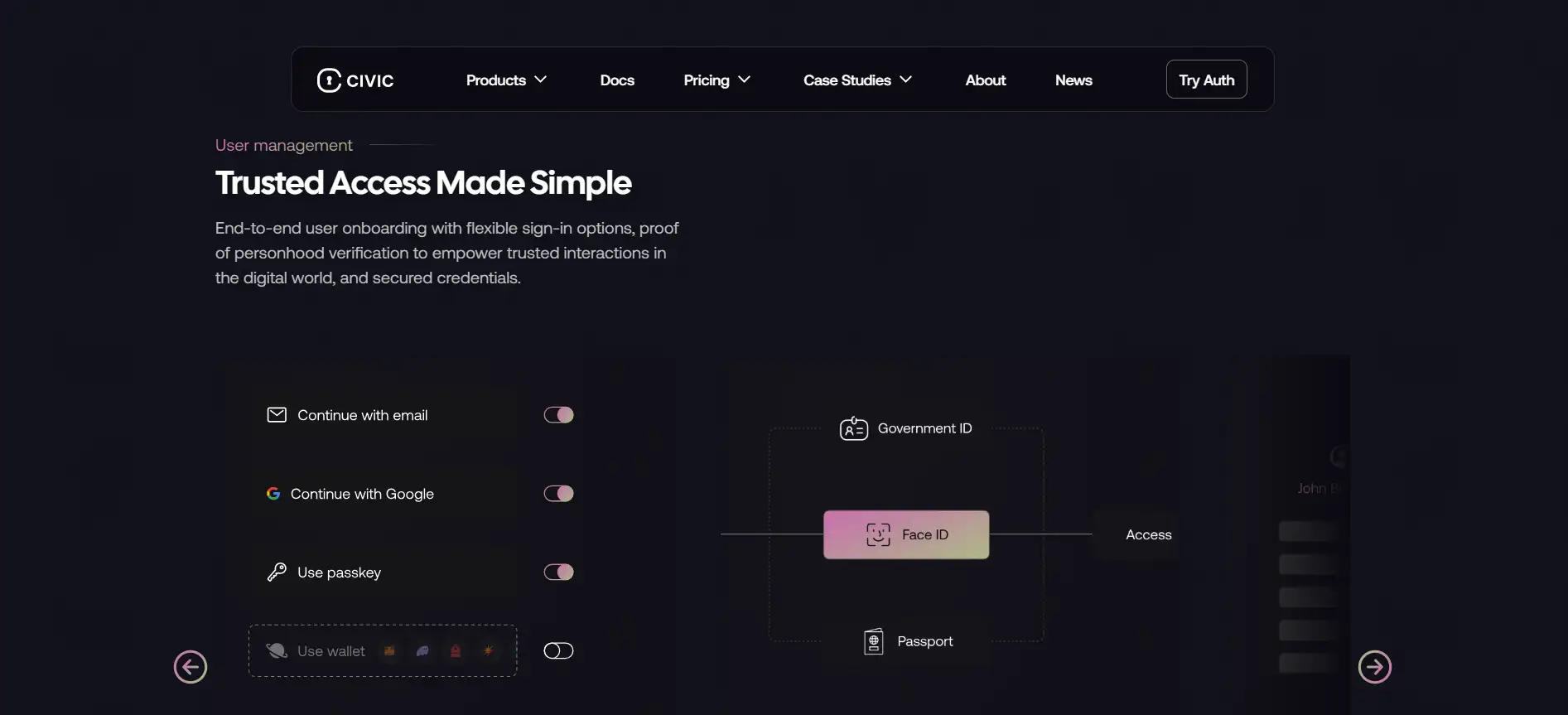About Civic
Civic is a decentralized identity platform built to empower users and developers with advanced, secure, and private authentication tools. Founded in 2015, Civic has grown to become one of the leading forces in the Web3 identity verification space. The platform aims to redefine how individuals prove their identity online by giving them ownership and control of their data through a blockchain-based infrastructure. At the heart of the Civic model lies the concept of Proof of Personhood, which ensures every user is unique, real, and verified—eliminating bots and fake accounts in digital ecosystems.
Through its flagship products, Civic Auth and Civic Pass, the platform offers seamless user onboarding, liveness detection, age verification, wallet-based sign-ins, and biometric uniqueness checks—all integrated with just a few lines of code. Civic continues to serve as a robust layer of trust for applications in gaming, DeFi, DAOs, AI, and more, prioritizing privacy, compliance, and scalability in an increasingly decentralized world.
Civic began its journey with a bold vision: to make identity accessible, user-controlled, and secure. Traditional digital identity systems rely on centralized databases and password-based credentials, which are prone to breaches, fraud, and privacy violations. In contrast, Civic built its model around decentralized identity, anchored in the belief that identity should be a human right and accessible to all. Its solution empowers users to retain control of their data while ensuring applications can verify identities in a secure and trustless manner.
One of Civic’s most innovative products is Civic Auth, a powerful tool that enables authentication across Web2 and Web3 channels. Users can log in using email, Google, wallets, or passkeys. The SDK supports embedded wallets and offers a drag-and-drop UI for complete flexibility. This positions Civic Auth as a preferred onboarding method for apps that want to reach both crypto-native and mainstream users. Another cornerstone offering is Civic Pass, a comprehensive suite of verification and access control tools designed for smart contracts and decentralized applications. It offers liveness detection, biometric uniqueness, government ID checks, and Proof of Personhood signals that meet regulatory and security standards.
The platform is used across multiple verticals including DeFi, GameFi, DAOs, AI agents, and real-world assets. Projects like Passport XYZ and Honeyland have integrated Civic to combat Sybil attacks, improve reputation scoring, and secure in-game economies. Civic's tools have blocked over 200,000 bots and issued more than 1.1 million Civic Passes as of late 2024. This extensive adoption shows Civic’s importance in the new identity layer for Web3.
With compatibility across 14+ blockchains and support for frameworks like React and Node.js, developers can integrate Civic easily. Its lightweight SDK, embedded wallets, and on-chain attestation system ensure high performance while preserving user privacy. Compared to competitors like Worldcoin, Polygon ID, and Veriff, Civic stands out for its privacy-first approach, flexible verification levels, and real-world implementations. It is built to scale with the next generation of applications that demand secure, real-time identity verification without centralized oversight.
Civic provides numerous benefits and features that make it a standout project in the digital identity landscape:
- Flexible Authentication: Civic Auth supports logins via email, Google, wallets, and passkeys, making it ideal for both Web2 and Web3 users.
- Proof of Personhood: Advanced biometric, liveness, and uniqueness checks ensure every user is real and unique, helping prevent Sybil attacks and bot abuse.
- On-Chain Verification: Issues blockchain-attested credentials without exposing personal data, ensuring user privacy and auditability.
- Embedded Wallet Support: Developers can deploy apps with fully embedded wallets, offering users a frictionless onboarding experience.
- Multi-Chain Compatibility: Civic works across 14+ networks including Ethereum, Solana, and custom chains.
- Compliance-Ready: Verification methods include age checks, location checks, government IDs, and more, making Civic a strong tool for regulated sectors.
- Developer-Centric Design: Easy integration with React and NodeJS SDKs, drag-and-drop UI, and dashboard configuration.
Civic provides a streamlined way for developers and teams to add secure, scalable identity features to their applications:
-
Step 1 – Install the SDK: Add Civic to your project with
npm install @civic/auth. - Step 2 – Get Your Client ID: Register and retrieve your unique client ID from the Civic dashboard.
- Step 3 – Integrate and Customize: Use a single function call to implement Civic Auth. Customize login methods with Civic’s drag-and-drop UI editor.
- Add Civic Pass: Choose the verification level that matches your use case and integrate verification tools directly into your smart contracts or dApps.
- Explore Use Cases: Whether you're building a DeFi app, a GameFi project, or launching an NFT community, Civic supports use cases across sectors.
- View Docs and Support: For full documentation and implementation guidance, visit the official Civic Docs.
Civic FAQ
Civic uses privacy-preserving cryptography to store verification data off-chain while issuing on-chain attestations without including personal information. The result is a system where Civic guarantees identity without exposing the user, making it both secure and compliant.
Absolutely. Civic Pass includes options for government-issued ID verification, geolocation checks, and customizable verification tiers, allowing DeFi platforms to implement compliance-ready workflows for KYC, AML, and jurisdictional restrictions.
Yes, Civic provides tools that authenticate AI agent operators, adding a layer of trust and transparency to decentralized AI systems. This helps prevent Sybil-style automation attacks and ensures ethical AI usage in smart contract environments.
Civic’s player verification tools let game studios implement 1-player-1-wallet identity rules without heavy friction. Through biometric liveness and uniqueness checks, Civic protects in-game economies from multi-account exploitation, driving both engagement and fair reward distribution.
You Might Also Like












